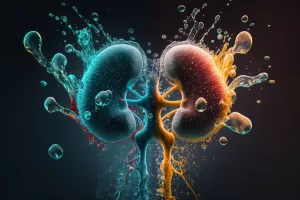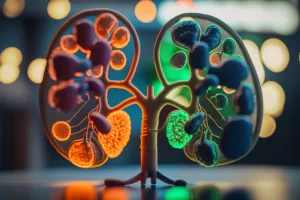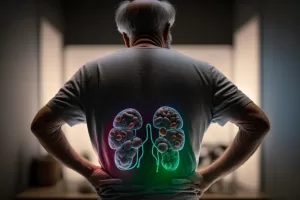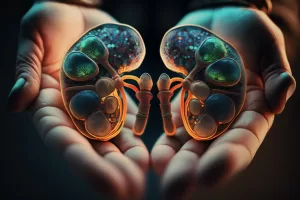Kidneys are the essential organs of the human organism. Their main task is to remove waste from our blood. Also, these are the kidneys that help us get rid of excess fluid. Once your kidneys are damaged, they can no longer perform their function as they should. If this condition gets permanent, it is called chronic kidney disease (CKD). This diagnosis implies a gradual reduction of kidney function. This will continue until the moment your kidneys fail.
The Manifestations of Kidney Disease
While many acute health conditions show almost immediately, impaired kidney function may take months to show up. The disease tends to progress slowly, so you may have few-to-no symptoms of renal disorder. Usually, problems with kidneys are found during routine blood or urine tests. If this is the case, you are really lucky as you still have time to take control of the disease progression.
In many cases, however, you’ll get some noticeable symptoms not sooner than you move to an advanced stage of kidney disease. The manifestations reported most often include
- nausea;
- tiredness;
- swelling of the limbs;
- decreased urination or vice versa;
- poor appetite;
- muscle cramping;
- uncontrolled high blood pressure;
- skin manifestations (itchiness and dryness);
- trouble breathing due to the buildup of fluid in the lungs;
- the feeling of pressure in your chest resulting from the accumulation of fluid around the heart.
Such manifestations are the consequences of excess fluid building up in your body, as well as the intoxication of the organism and electrolyte imbalance. Renal disease progressing to kidney failure is only a question of time.
Conditions Triggering Renal Disease
Problems with your kidneys never come from nowhere. Developing kidney disease means there is a factor contributing to this condition. The task of your healthcare provider is to detect the primary cause of your disorder and concentrate on eliminating it until it’s too late. The health conditions that may trigger the development of chronic renal disease include
- High blood sugar. Untreated diabetes mellitus is a common cause of kidney disease. Excess blood glucose damages renal blood vessels and nerves, thus impairing the normal function of the organs.
- High blood pressure does significant damage to the arteries, making them less elastic and narrowing their lumen. This results in insufficient blood supply to the kidneys, leading to their dysfunction.
- Polycystic kidney disease is another possible cause of kidney damage. Unlike a healthy kidney, which looks smooth, the organ affected by this illness is covered with numerous cysts that don’t let it perform its function to the full. Polycystic kidneys are hereditary, so if any of your close relatives has it, there is a chance you’ve got it too.
- Inflammation of the kidneys (also called glomerulonephritis).
- High cholesterol may also affect the function of your bean-shaped organs by blocking the healthy blood supply to the kidneys with fatty deposits.
- Pyelonephritis is a medical condition describing recurrent kidney infections. People suffering from frequent infections are more prone to developing chronic kidney disease.
- Kidney stones may boost your chances of developing the renal disease as they interfere with the flow of urine from the organs, causing urinary stasis.
- An enlarged prostate can also play a trick on your kidney health. The pressure on the urinary ducts doesn’t let the urine flow freely. Therefore, you do not empty your bladder completely.
- Urine reflux, also called vesicoureteral reflux, is another condition contributing to chronic renal disease. It causes the urine to go back from the bladder to the kidneys, interfering with their normal function.
These are only some conditions that may give start significant kidney problems. The sooner you figure out the cause of your disease, the more effective your treatment will be.
Who Is More Prone to CKD?
Based on experience and scientific knowledge, a list of risk factors that boost your chances of kidney dysfunction has been worked out. Diabetes and high blood pressure are the best known of them. However, they are only a drop in the ocean of medical, environmental, and lifestyle factors that may contribute to sick kidneys.
Look at some of them to get a better understanding of whether you belong to the group at risk or shouldn’t worry about your kidney health.
- Belonging to Asian, Hispanic, African-American, or Native Americans;
- Inborn abnormalities in your kidney structure;
- Cardiovascular disorder;
- Renal disorders running in the family;
- Excessive body mass and obesity;
- The intake of medicines with kidney-damage potential;
- Advanced age;
- Smoking.
If none of these options applies to you, it still doesn’t guarantee you don’t get chronic kidney disease.
How Can Kidney Disease Be Detected?
Early detection of kidney disease allows getting more treatment options while slowing down the disease and taking complete control of it. People from the group of risk should undergo routine checkups of kidney function. Regular blood work and urine tests will let your GP notice any renal dysfunction at its early stage. Due to this, you’ll be able to work on restoring your kidney health before you get any visible symptoms and significant damage to the organs.
If your doctor suspects any structural changes in your organs, they may send you for a CT scan.It is a diagnostic, non-invasive procedure that allows the detection of changes in the size of the organ, the presence of kidney stones, or tumors that may interfere with the healthy function of kidneys.
How to Treat Chronic Kidney Disease?
The bad news, this disease is incurable. The good news – you can keep it at bay and improve your symptoms by receiving quality medical treatment. The therapy entirely depends on the severity of your condition. Usually, healthcare providers offer the following options:
- Lifestyle changes.Diet rich in fruits and veggies, healthy fats, and slow carbs is the basis for your overall health and renal health in particular. Give up smoking and alcohol consumption.
- Taking control over your chronic health conditions. High blood pressure and diabetes can do much harm to your kidneys only if you leave them untreated. By controlling your glucose levels and blood pressure, you make sure they do minimum damage to your vital organs and systems.
- Medicines intake. Certain drugs may have a positive influence on your kidney function. Diuretics, for instance, can resolve the fluid retention problem, thus preventing edema. Please note that it’s up to your healthcare provider whether they should recommend medicinal treatment or not.
- Dialysis is recommended for people with advanced stages of CKD. This medical procedure aims to overtake some kidney functions to remove waste from your organism. People with kidney failure can live years on dialysis.
- Kidney transplant surgery is the most radical option in chronic renal disease treatment. It is usually offered to people whose kidneys don’t work and whose function cannot be restored by any of the available conservative treatments.
In renal failure, dialysis or kidney transplant are the only effective treatments.





